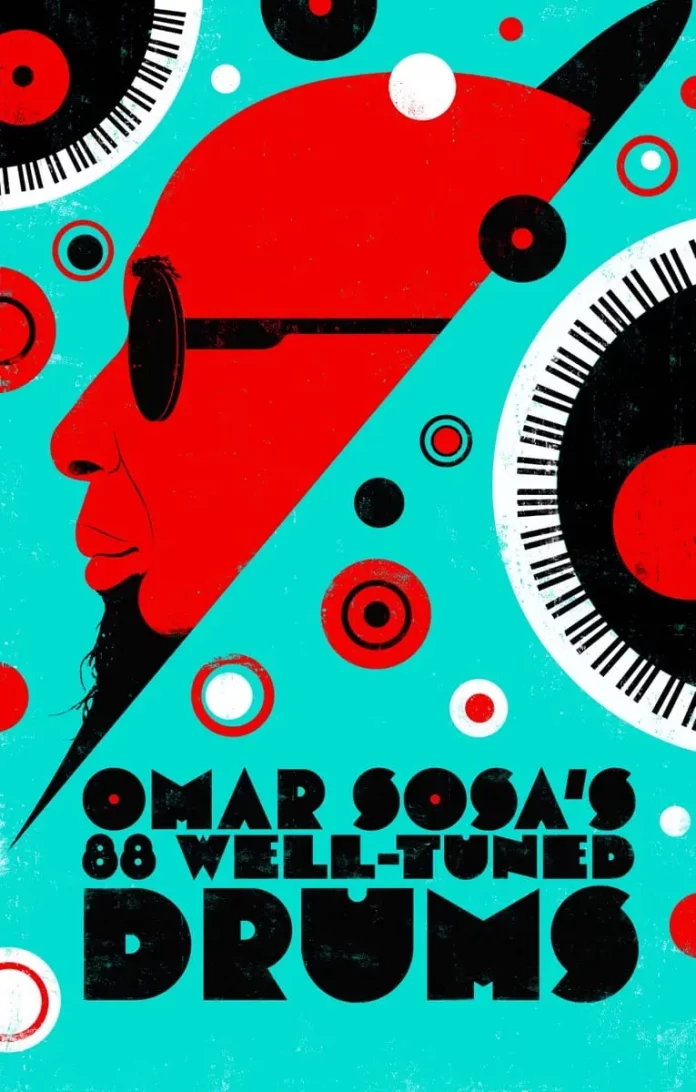This stunning film on the life and music of the Cuban pianist, bandleader and composer Omar Sosa (born 1965) received some 20 or so awards when it was premiered across America in 2022, including best art and music documentary and best feature documentary. Full credit must go to director Soren Sorensen, who marshalled an extraordinary range of material in the most lucid and visually magnetic manner, including some strikingly effective passages of animation set off by eerie moments of abstracted yet mood-rich percussion.
The film begins in mysterious, close-up mode as Sosa prepares to take the stage, candle and miniature deity in hand, in his familiar all-white garb and coloured scarf. He talks briefly about the colour symbolism (fundamentally of light and dark) which marks his presence on stage, explaining that it comes from the Afro-Cuban spiritual tradition known as Santeria.
And the reason he lights a candle before the commencement of every performance? “It’s to let the spirits know that we are ready to receive” Sosa volunteers, in that intimate and patient voice of his. From time to time the film is punctuated by gnomic remarks projected briefly on the screen and derived from a figure key to Sosa’s world: Elegua, Orisha of the Crossroads of Life and Death and central to the Yoruba religion of West Africa and the African diaspora.
A range of jazz writers, radio hosts and musicians (e.g., Joo Kraus, Childo Thomas, Leandro Saint-Hill and Paolo Fresu) then offer succinct characterisations of Sosa’s art. Is it jazz? Is it African or Afro-Cuban? Is it highly rhythmic? Or deeply contemplative? Perhaps it is all these. The question of virtuosity arises and it is Sosa’s long esteemed compatriot, the great Chucho Valdés, who offers the most intriguing suggestion.
Virtuosity, says Valdés, has nothing to do with technique, with how many notes you can play or how fast you can play them. For Valdés, true virtuosity – exemplified by Sosa – lies in the depth of one’s personality, one’s soul, as it emerges in music that has its own distinctive and unmistakable voice. Later we learn how Sosa was moved to tears when he heard how much Valdés valued Sosa’s Eggun – his mesmeric revisioning of Miles Davis’s Kind Of Blue for a specially commissioned performance at the 2009 Barcelona Jazz Festival.
We learn about early days in Cuba, when the Russian teachers at Havana’s Escuela Nacional de Música focused exclusively on classical music (and where Sosa played percussion, not piano). Relief came from tuning in secretly at night to FM radio in Miami. Sosa began to love the music of Coltrane and, in particular, Monk before one of the biggest stimuli of his early life came through his exposure to Weather Report’s Heavy Weather. There’s a wonderful clip, later on, of Sosa performing with Manolo Badrena, who had featured on Heavy Weather along with Jaco Pastorius, who also had a major impact on Sosa.
It’s difficult to do justice, in a relatively short review, to the overall richness of 88 Well-Tuned Drums. We learn about Sosa having to churn out “salsa” jingles to make an early living and hear of the difficulties of life on the road, as well as Sosa’s extraordinary experiences while playing in Angola during the civil war there.
Above all, we witness the emergence of a most soulful musician, open to creative dialogue across the world, as documented in a compelling range of clips from performances with, e.g., Sosa’s Quarteto AfroCubano (with Leandro Saint-Hill, Childo Thomas and Ernesto Simpson), Peter Apfelbaum, Paolo Fresu, Seckou Keita, Gustavo Ovalles and Yilian Cañizares. Totally recommended.
Omar Sosa’s 88 Well-Tuned Drums. Director Soren Sorensen; colour, 98 mins, 2022. omarsosafilm.com
















